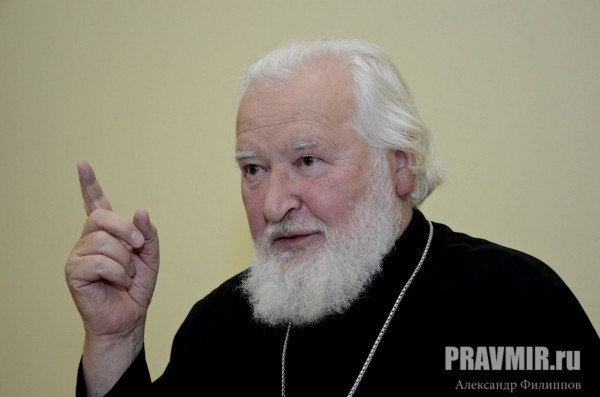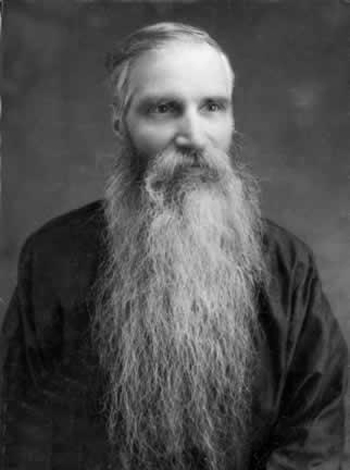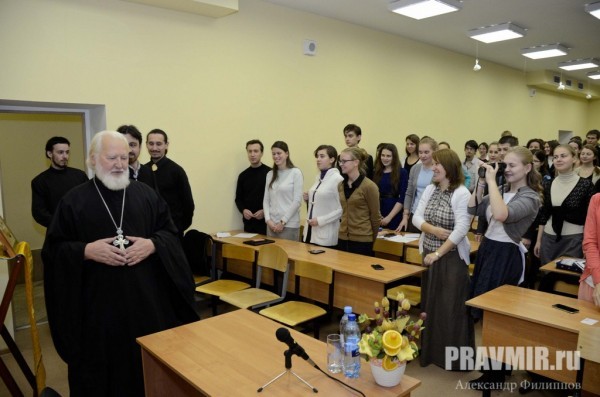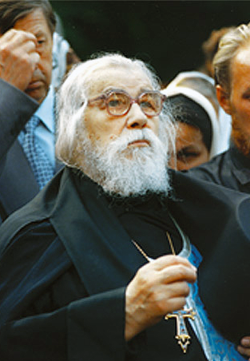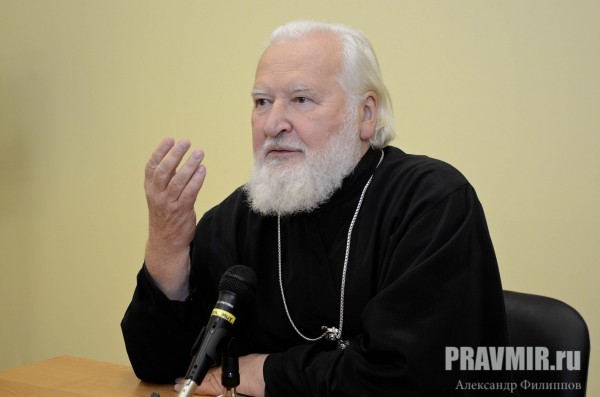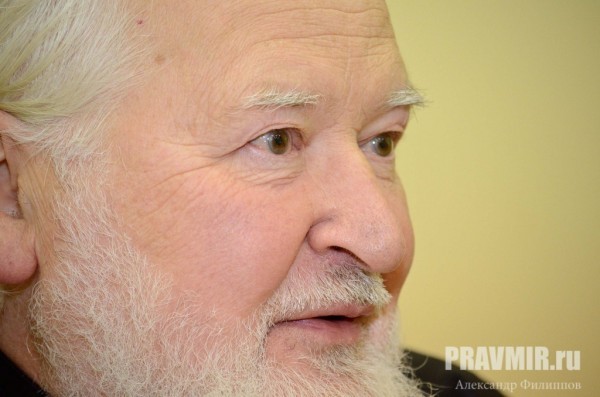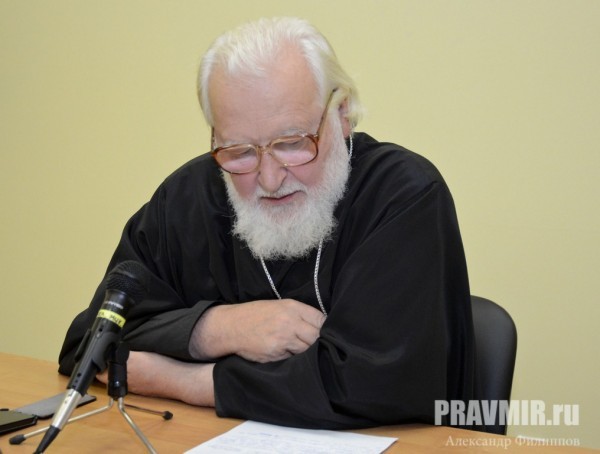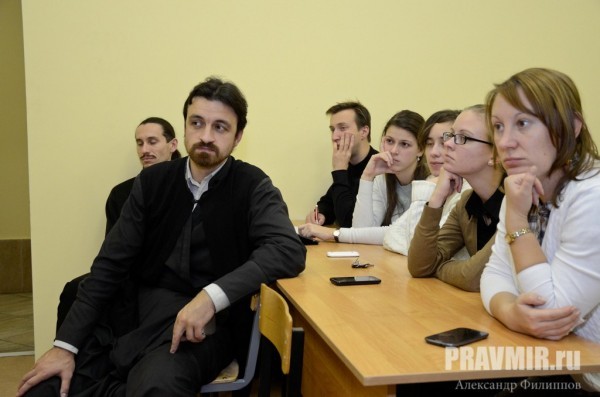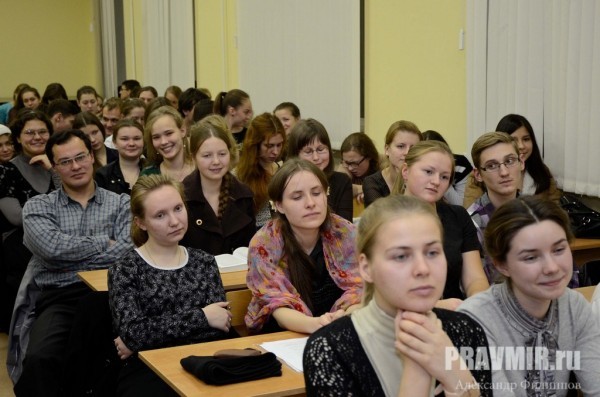What is spiritual life?
– How can we understand whether or not the Holy Spirit is a person? At the end of January 1978, I went to a wonderful starets, Archimandrite Tavrion Batozskiy. He was seriously ill with cancer, and I didn’t know if I would see him or not.
You had to go through the woods from the bus stop. It was quite dark. The snow glistened and the stars were on fire. When I entered the monastery, it seemed as though everyone was asleep, but there were already a lot of pilgrims in the temple. Those who came to the monastery, received Holy Communion every day. Many criticized Father Tavrion for that.
I went into the temple and heard them reading something, and after a while realized that it was a homily of Symeon the New Theologian. They read the place where St. Symeon explains: if anyone says that the Holy Spirit in him, but it is not noticeable, then — it is not true, because the presence of the Holy Spirit in one’s heart can not be confused. It’s like a fragrance in the nostrils or light to the eye.
Suddenly, Father Tavrion came out from the altar and said : “You know, I give my blessing for all to take communion frequently. When I come to the Last Judgment, God will ask me: “How could you give communion to everyone every day? From where have you gained such a confidence?” I will answer him: “I warned them. The words of St. Symeon is a warning. ”
It means: Don’t fool yourself. If you don’t feel the presence of the Holy Spirit, this means He is not in you. In this case, don’t go to communion frequently. You are not ready to live the grace of a spiritual life.
Apostle Paul speaks a little differently about this: “Any one who does not have the Spirit of Christ does not belong to him” (Rom. 8: 9). Spiritual life is not broad intellectual interests. It is not literature, nor theater, nor a conservatory. It is life with the Holy Spirit in the heart.
The presence of the Holy Spirit can be recognized by the signs that led the Apostle Paul and then Seraphim of Sarov. It is a heartful world. It is the joy of the Lord. It is the love of God and people. It is piety, chastity and purity.
When a person’s heart is free of the passions, it belongs to God and is easy on the soul, because with God, there is nothing to fear. God is always joyful. When a man is with God, he does not want anything foul or vile, such as drunkenness, drugs, fornication, or unclean resentment. He can’t have despair and depression.
Being captive to sin is difficult. With God, there is no captivity, even if a person is in jail. Still, with God, there is freedom. As confessors of the twentieth century mention: “With God, good is always everywhere.”
– How does one attain a spiritual life?
– You can’t give a definite answer. Spiritual life cannot be “bought,” even with some sort of deed. “The Spirit breathes where He will.” “…it is not by measure that He gives the Spirit” (John 3: 34). God wants to give each person the grace of the Holy Spirit — and always gives it, whenever a person can hold it in his heart.
When a person aspires to be considered worthy of the grace of God and asks God for it, then, even if he is not a saint, but has a pure heart and loves God, God gives him His grace.
So that life with God gains permanence, deeds are needed, or as the ancients said — ascesis. This does not mean that it is necessary to go into the desert. It means that people do not indulge their passions, they limit themselves on the earth, to make room for the Holy Spirit. God doesn’t come to be in”second place” in the heart of man. He needs to be given “first place.”
– Did you meet with other startsy?
– Not once. Usually you go to a starets with questions that require an answer. You come, for example, to Father Ioann (Krestyankin), and need to wait (there was always a line to see him). Finally, you go to him in his cell and … all the questions disappear instantly. All that is troubling instantly becomes so small, and the heart is filled with grace.
Holy startsy are all different. One starets, listens and is silent, praying to God for you. Father Ioann, was the opposite. He often didn’t give those who came to see him the chance to say a single word, He talked quickly, in a machine-gun sort of speech, and even gasped a little. He spoke, sitting on a sofa while doing something else, as I sat on a bench .
Listening to him, you suddenly realize that he answers all of your questions — the ones that you wanted to ask, and even those you didn’t think to ask — talking about your thoughts as if seeing right through your soul.
At the end of the 1980s, the Soviet government collapsed and the future was unclear. The Church hierarchy was waiting, and the people of the Church began to act. They began to establish brotherhoods, and we also decided to establish our own brotherhood. This idea came to us to August 29, 1990 on the the Faest of the Image “Not-Made-By-Hands” of our Lord Jesus Christ, so we decided to create the Brotherhood in the Name of the All-Merciful Savior. We needed to ask for a blessing.
I went to Father Ioann (Krestyankin) and waited for my turn. I went to him in his cell, and he wouldn’t let me say a word. He said: “Tanya (to his cell attendant – Tatyana Sergeyevna), get this icon here.” I didn’t understand anything, but Tatyana got the image of the Savior Not Made by Hands and gave it to Father Ioann, and Father Ioann blessed it for me.
– Is it necessary to seek a “deep repentance” at every confession? Even if confessing often?
– The Russian word for “repentance” (покаяние – pokayaniye) is derived from the name of Cain — the first sinner, who killed his brother Abel. The Russian word “окаивать” (okaivat) means “to blame yourself.”
The Greek word “metanoia” (Greek. ” μετάνοια”, “change of mind,” “rethinking”) has a different meaning. As you remember, John the Baptist came preaching, which began in the Slavic translation with the word “покайтеся” (pokaytecya), meaning “repent…”In Greek, it sounded a little different – μετανοετε (Mt.3: 2), which literally means “change the mind”, “change the mindset,” “change”.
When a person truly repents, it means that he decided to change, to “change his mind”, i.e. “start a new life.” When a sinner comes with such serious, sincere repentance, the priest feels like grace passes through him.
Is it possible though to repent like this every month? If a person repented like this every month, it would mean that each time he falls away from God and then “starts a new life.” Is this possible? Of course not! In the early Church, it was believed that this sort of repentance is only possible once in a lifetime. Then you recognize that you can not repent once: if the man fell into a mortal sin, he can again receive the sacrament of penance — but he has to change once and for all.
If the sinner is like a pendulum and has changed in one direction, and then the other, then it is not repentance. The soul of man is not able to change so, back and forth. This means that the soul is seriously ill and it is not repentance.
There are different types of confession. On the subject of “Introduction to the liturgical tradition” will be the theme of the Sacrament of Penance. When fulfilling the sacrament of penance for the first time, if a person has been baptized but did not go to church, then regained his faith, and for the first time comes to confession, this sort of confession is sometimes called “general.” The best way for this sort of confession is given in the Book of Needs: “second baptism.” General confession is made when it is clear that a person is really starting a new life.
What can we say about confession every week or even every day? The ancient monks went into the desert, and, at first, in ancient times, lived alone. There were cells or caves. Even today, if you have been to Israel, Turkey, or Egypt, you may have seen these cave monasteries.
Each monk had his Abba — spiritual father. In ancient times, he didn’t have a priestly call. It was believed that monasticism was incompatible with the priesthood. The faithful believed that priests serve the people and is among them, while monks flee from the world.
Monks learned spiritual life from their Abba. Every day, he revealed his thoughts to him: “Abba, today a demon put such and such thoughts in my head. I sat in judgment and anger came into my soul. ”
This is not a radical change in his life. It is his struggle with temptation and with his passions —and the revelation of thoughts and answers of the starets are a school of spiritual growth.
This sort of confession is very useful, but it wasn’t the sacrament of penance. Even if we do not live in the desert, every evening when we pray to God, we can remember our sins and ask for forgiveness before an icon. Likewise, we can confess to a priest every week.
For various historical reasons, these two approaches to confession were combined. Often, the sacrament of penance had not been performed. In the first century, prayers of repentance were recited before the Eucharist, but it was not considered a sacrament. There have never been a sufficient number of temples in Russia. At first, they were only in the cities. People rarely received communion — usually once a year. A true confession was required before communion.
Then, when the so called “Eucharistic revival” occurred and people in the cities received communion more frequently, the question arose: What do we do with the confession before each communion? Abroad, for example, in Greece, you can often receive communion without confession and you need to confess with your spiritual father, when there is a need for it.
We can’t follow this practice, because, if you cancel mandatory confessions before communion, then it is unclear who will come to partake in the sacrament.
Regular worshipers, though, whom we know to have learned church life and whom will realize that one can not receive Communion with unconfessed grave sins, might receive a blessing to partake in communion by Church hierarchy — or, in the case of a small sin — a very brief confession, which is not, and should not be a “new beginning.”
– How often should I receive communion?
– St. Seraphim said: “The more often one receives communion, the better.” Of course, it refers to those Christians who truly try to live Christian lives. There are two rules that govern Eucharistic life.
One rule says that if someone came to the meeting (that is, to the Eucharist) and does not receive the Holy Mysteries, let him be excommunicated from the Church (Apostolic rule 9: “All the faithful that are going to church and listening to scripture, but not staying in prayer and receiving Holy Communion to the end, are like those generating disorder and deserve excommunication from the Church).
This is because during the liturgy, Christ tells us: “Take, eat; this is my body,” and about the Cup — “Drink of it all of you; this is my blood.” If a person does not receive communion, then it means he doesn’t need it.
The second rule says that if a person, for no particular reason, was not in the Eucharistic assembly for more than three weeks in a row, he is considered to have fallen away from the Church (for example, a Sardis Cathedral rule: “If any layman, staying in the city for three Sundays has not come to a service during those three weeks, he will be removed from contact with the Church” ). That is to say, if he considers it possible to live without liturgy and without Eucharist, then what sort of Christian is he?
A Christian can not live without Christ. Therefore, you can answer the question of how often to receive communion: at least once every three weeks. This provision has been removed by the Russian people, particularly, for historical reasons.
The vast majority of Russian people have never heard of such rules. For example, in the XIX century, it was common in cities to go to the temple to “listen to the liturgy.” “Listen!” Not to receive communion, but “to listen.”
I remember in my youth, I was coming out of Nikolo-Kuznetsk Temple after a service. At the time, the temple replaced the psalmist. I was approached by a very nice, intelligent old man who asked: “Tell me, please, can the new psalmist perform Tchaikovsky and Rachmaninoff? I love to go to the temple to listen to Tchaikovsky.”
This is a very typical example. Why receive communion? You can “listen to Rachmaninoff.” The early Christians thought differently. Christ was in the first place for them.
– Does the selection of a spiritual father have a critical meaning?
– Yes, it does, and so much more. The Greek Church still preserves the ancient rule that a spiritual father may only be an aged, experienced priest with a special hirotesia, episcopal placement as a confessor, and corresponding credentials.
Most of the spiritual fathers in Greece are elderly monks. This happened because Greek monks have retained a special authority since the time of the iconoclasm. At the time, iconodules were terribly persecuted and almost all members of the white clergy obeyed iconoclasts because it was difficult for them to resist the will of the emperor.
If a priest did not agree with the order to reject icons, he was banished into exile and persecuted — and, for the sake of their families, priests were not persistent. Something similar happened in Russia during Renovationism under the Soviet regime.
Monks, who rejected the world and all things in the world, showed great fortitude. It was cloisters of monks, in particular, that saved the veneration of icons. Then the tradition arose that it was better to go to the monastery for confession.
One also could not confess to just any monk, but only an experienced monk over whom a special hirotesia had been performed. Of course, in the case of mortal danger, one could confess to any priest. Young priests, though, could not have spiritual children or exercise spiritual leadership under any circumstances.
There are, unfortunately, sad experiences with modern spiritual fathers. Frequently, people come and say that “such-and-such penance was imposed on me.” Often, it is obvious that this person can’t bear the penance, and that the hieromonk or priest simply imposed it as a perfunctory admonishment from the Euchologion, but without understanding. He does not even know that he doesn’t have the right to give penance in this manner.
For example, a doctor has no right to say: “Take the medicine and don’t come back anymore.” The doctor must say: “Take the medicine and come back in a week. I have to look at you, do some tests, and understand how the medicine is working.” It is irresponsible to just give a powerful drug like that. Similarly, the confessor has no right to impose penance if he won’t see the person again and will not follow up: Has this penance produced good fruit, or has the person simply stopped going to church? Penance can be given to his spiritual children, whom he sees and knows.
It is best if a young priest does not rush to become a confessor — it is better if the repentant goes to an experienced priest, if possible. It is better for young priests to start with children, because they usually have their own — and since they better understand how to deal with children, they are less likely to make a mistake with them.
– How does one choose a spiritual father?
– This must be approached with caution. The apostle Paul has written: “For though you have countless guides in Christ, you do not have many fathers. For I became your father in Christ… (1 Cor. 4:15). This means: “I reared you for life in the Holy Spirit and life in the Church.”
A person baptized as a child, but not brought up in the faith and not instructed by a church centered spiritual life, often experiences his parish church as a spiritual birth and understands that it was specifically that priest which led him to faith. If we are bound by blood kinship with our father in the flesh, then that relation is spiritual with our spiritual father. First and foremost, we need to love our spiritual father “for Christ’s sake.”
The priesthood is a gift. That gift is to wear the image of Christ. There are many nice icons and a lot of mediocre ones that were unsuccessful, but we still pray in front of them and put them in the red corner. It is the same with priests: maybe he is not outstanding, but it is necessary to see and love the servant of Christ in him.
Second – we should listen to our spiritual father. All children should obey their parents: “Obedience is more than fasting and prayer.” Without obedience there is no spiritual life. Essentially, this is a vow of obedience. If you want to be a spiritual child, you promise to obey.
Third, we need to learn humility from our spiritual father. Recently, the book “My Life with Starets Joseph” was published, which was written by the remarkable starets, Archimandrite Ephraim. I’ve have had the occasion to see him several times. His spiritual life began with obedience to starets Joseph Hesychast — the great saint of the twentieth century.
The name of starets Joseph the Hesychast is connected with the resurgence of spiritual life on Mount Athos, which had been in great decline at the beginning of the twentieth century. Ephraim was still a boy when he came to starets Joseph on Mount Athos. He was accepted and told that he would have to obey. He piously listened to him his entire life, though the starets scolded him constantly. Ephraim only replied : “Be blessed, Father.” He knew that it was the path of spiritual life.
It seemed that his starets had no pity, but the result is obvious: he became abbot of one of the best monasteries on Mount Athos, and then founded many new monasteries in Greece and America.
Don’t be offended by a spiritual father. You need to believe him. You need to pray for your spiritual father so that the Lord will establish your spiritual life through him. If there isn’t this sort of relationship, and it didn’t work out, then you are not a spiritual child, no matter how much you have confessed to the supposed spiritual father.
– How can humility be learned?
– This is the most important question. Pride is called the mother of all evils, and humility — the mother of all virtues. What is said about humility is not said about any other virtue: “without humility, one can not be saved.” “God opposes the proud but gives grace to the humble” (Jas. 4:6).
If a person is humble, God gives him grace. Pride is the greatest impurity. It is a devilish sin. It is the core of satanic influence on a person.
Humility … It appears that the holy fathers have no precise definition of humility. You will find many references from them about humility, but I have only found one definition — St. Isaac the Syrian says: “Humility is the garment of the Godhead.” As you see, a very imaginative and mysterious definition.
There is a simple way to learn if a person has humility. One must ask: “Do you have pride?” If he says no, then it means that he is far from humility. If he sincerely says, “Yes, I am very proud. I can’t cope with this disaster.” It means that glimpses of humility have already appeared.
In what does pride appear? The first sign is offense. If a person is offended or offends someone, this means he is proud. Do you offend some or have you been offended? Learn not to take offense. Try not to judge people — not only loved ones, but everyone.
“For with the judgment you pronounce you will be judged…” (Matt. 7: 2). These words of Christ are fulfilled literally. That is to say, not only will you be judged as harshly as you judge, but you will be judged for the same, for which you condemn. If you condemn someone, most likely, you will fall into the same sin. All people with experienced spiritual lives know this.
On the other hand, the Lord said: “Judge not, that you be not judged.” If you will not condemn anyone, then the Lord promises not to judge you. This is the easiest way to salvation. And what about the need to judge? It’s just a bad habit. Set a goal — do not blame anyone — and be saved.
– Secular media talk about the political and economic aspects of the situation in Ukraine. No one speaks about the spiritual side. What do you think about the spiritual causes of what is happening in Ukraine?
– All our souls hurt when we see the terrible events of war — the disasters, the violent deaths. What is happening in Ukraine, in the spiritual sense? In one sense, nothing new, “…the whole world is in the power of the evil one.” (1 John 5: 19). Jesus Christ calls Satan, the “Prince of this world.” This world lives according to the laws of evil.
The Lord says that Satan is the father of lies, but the Lord said of the Church: “Fear not, little flock…” (Lk. 12:32). and “the gates of Hades shall not prevail against the Church” (Matt. 4:18 PM). That is to say, the earthly Church stands at the gates of hell, but they can can not win over the Church. It is also said: “The light shines in the darkness, and the darkness has not overcome it” (John. 1: 5).
The history of the Ukraine is covered in a web of lies. What is happening in the Ukraine is realization of the principle, “divide and rule”. Kiev, though, is the “mother of Russian cities.” We have a common history with Ukrainians — Great Russia, Little Russia. This is our common country. We have one Orthodox Church, one common Gospel and a common Slavic service.
We are all understood when we travel to the Ukraine, and all Ukrainians are understood in Russia. In Russia, every family has Ukrainian blood, likewise, in the Ukraine, Russian blood is, literally, in every family. We are true brothers, and a brotherly nation of one people.
For all of us, the war in the Ukraine — is absurd and a devilish delusion, for there, the blood of our brothers is being spilled. It is a tragedy. May God prevent mutual hatred from being kindled, because it has a devilish goal and is a satanic thing. We must pray to God for Ukrainians and pity them with all our hearts. They are in peril. We must help them as much as we have strength. Our brothers are suffering hardships.
Translated from the Russian.












